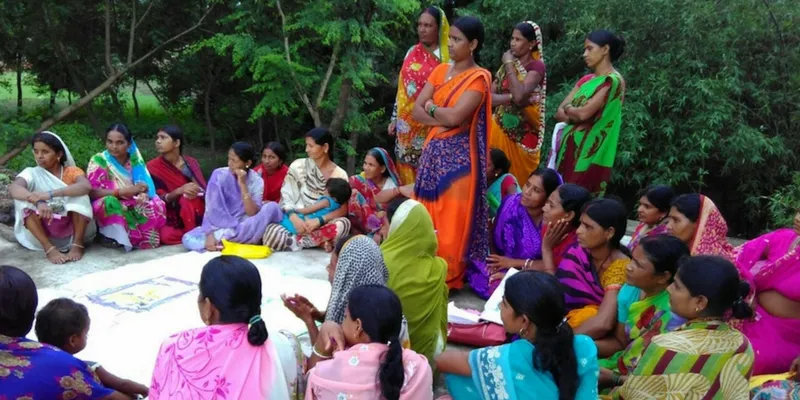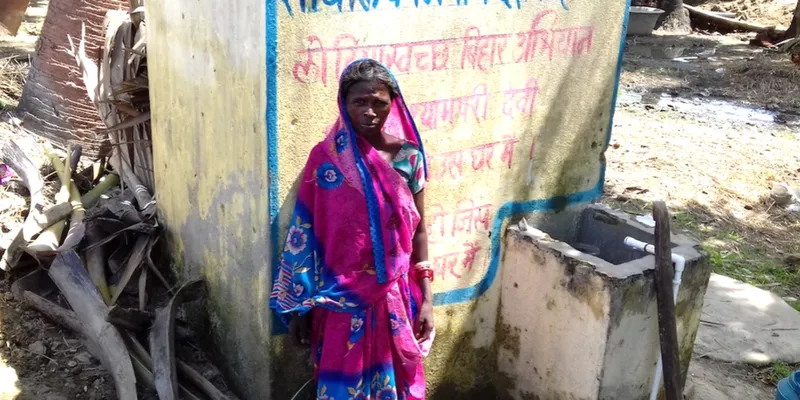14,000 rural women are changing Bihar, one toilet at a time
Women self-help groups in villages of Jehanabad have become the harbingers of social change by convincing people about the usefulness of building toilets at homes and ending open defecation.

Poonam Devi and Nageena Devi have reason to be proud. Leading from the front, these two women have succeeded in their mission that there is no open defecation in their village. They achieved this one step at a time - building toilets in their homes, and motivating others to follow suit.
Poonam, who is in her mid-40s, is the head of Ujwal Gram Sanghatan, a women’s self-help group (SHG) in Kalanaur village in Bihar and is one of the thousands of jeevika didis (livelihood sisters) in the state. The Bihar government’ rural livelihood project ‘Jeevika’ has been instrumental setting up women’s self-help groups and motivating rural women to construct and use toilets for self-dignity and better hygiene.
Nageena heads the Tulsi Samuh SHG of Dharnai village in Jehanabad district, and is also a jeevika didi.
Change begins at home
When I decided to construct a toilet in my house by taking a loan from my SHG, my husband opposed it. He felt there was no need for a toilet since we live in a mud house. I finally convinced him and constructed it, Poonam said.
Similarly, Nageena was the first in her village to construct a toilet in her house with a loan from her SHG. “Who would think of constructing a toilet, especially with borrowed money. But I made it happen,” she said.

Impressed, the Barabar Saway Siddha Mahila Vikas Sawalambi Sahkari Samiti Limited Federation (BSSMVSS), a voluntary organisation in Makhdumpur, asked Poonam and Nageena to lead a team of jeevika didis in their campaign to build toilets. “After building a toilet in my house, I worked with a team of women and successfully motivated and helped others to construct toilets,” said Nageena.
"There are hundreds of jeevika didis like Poonam and Nageena who had constructed a toilet with a loan from their SHGs and then joined us to motivate other women to do the same," Sunil Kumar, BSSMVSS’s field officer, said.
Overcoming challenges
“In several villages across Bihar, toilets constructed through government programmes are used as a godown or a dumping site, since most are not operational,” said Indu Devi, president of BSSMVSS.
Asha Devi, a jeevika didi from Kalanaur, said, It was a difficult task to convince men to construct a toilet. The men claimed one should relieve themselves outside and there was no need to construct a toilet, especially on borrowed money.
Sometimes, the men even damaged toilets under construction to show their disapproval.
The collective power of women finally convinced the men. “Jeevika didis have made a big difference by persistently persuading women to take ownership of the toilets they construct and to use them,” added Indu Devi.
Kanti Devi and Reena Devi of Dharnai said they built toilets after learning from jeevika didis that open defecation can lead to ill health and diseases. Jehanabad’s jeevika district project manager Manish Kumar said women and girls no longer go to the fields to defecate.
Facilitating change
Community meetings were held to discuss the ill effects of open defecation, and some tough measures were also taken. Nigrani samiti or vigilance committee comprising women from SHGs keep watch to identify violators. They also initiated lota jalao, where plastic bottles in which people carried water to the field was snatched and burnt.
Lack of money was a deterrent to persuade women to build toilets. So, loans were arranged through SHGs. Basically, the money is their own savings that they had deposited with their SHG, Indu Devi said.
A rural sanitary mart established in Kalanaur two years ago facilitates easy availability of good quality material required for construction of toilets. BSSMVSS ensures the construction is also of good quality.
More toilets
Nearly 1,000 SHGs with about 14,000 women members from different villages are operating in 22 panchayats in Makhdumpur block, a stronghold of Maoist insurgents until about a decade ago.
In Kalanaur, there were less than 25 toilets, most in the houses of upper caste people. Thanks to jeevika didis’ efforts, the mahadalits — those considered untouchables by upper caste Hindus — have also built toilets.
Some 1,753 toilets have been built in Kalanaur gram panchayat. Similarly, in Dharnai panchayat, 1,231 toilets have been built in the last two years. It with pride that the jeevika didis announce that the panchayats of Kalanaur and Dharnai have been declared open defecation free by the state government.
Successful model
The Jeevika programme was launched by the state government with the assistance from the World Bank in 2006. Thanks to a door-to-door campaign involving women, over 100,000 toilets have been built in Bihar, covering hundreds of villages in 21 districts over the last two years.
Bihar Rural Development Minister Shrawan Kumar said 580,000 SHGs have been set up under the Jeevika scheme, and the government plans to increase them to a million by 2018-19. Each SHG has at least a dozen women members creating awareness about the connection between sanitation, hygiene and health.
“Till date, 18 blocks, 717 gram panchayats, and 4,000 villages have been declared open defecation free. Eighteen lakh toilets have been constructed in the state, but there is a long to go as nearly 1.5 crore toilets need to be constructed,” the minister said.
He added that the aim was to have the state go open defecation free by 2019.
“Jeevika didis have been playing an important role in creating awareness about the need for toilets and in motivating women to construct toilets,” Balamurugan Devaraj IAS, CEO-cum-State Mission Director of Jeevika programme said. “Their role in social mobilisation and behavioral change would help us achieve an open defecation free Bihar.”
Disclaimer: This article, authored by Mohd Imran Khan, was first published in VillageSquare.in. The views expressed by the author are her own and do not necessarily reflect that of YourStory.







